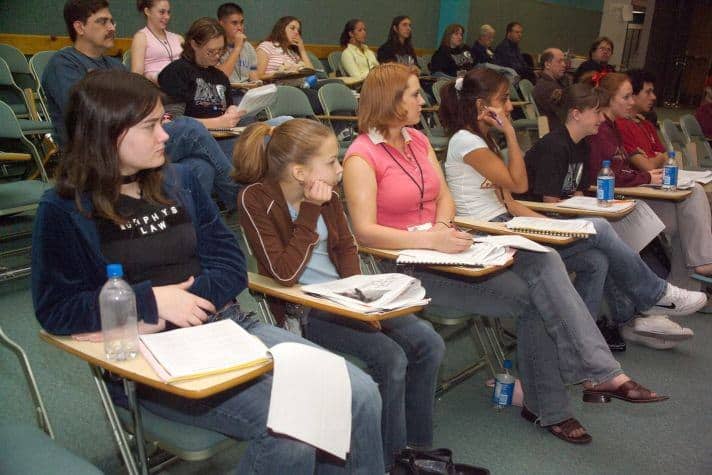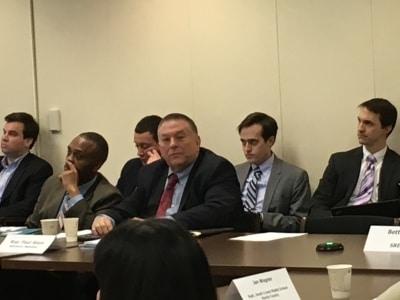Superintendents and some members of the State Board of Education have reservations about a proposed pilot that would implement student perception surveys of teachers around the state.
State-led student surveys of teachers have been used in various iterations for years, but the Department of Public Instruction is currently preparing a three-year pilot, targeting students in grades 3-12. It would be implemented in the 2016-17 school year. The policy developed by DPI says the department “may develop a phased implementation plan with full state-wide implementation in the 2018-19 school year.” Districts would be asked to administer the surveys to their students.
“I’m not sure we’ve thoroughly discussed the surveys or blessed current pilots,” said State Board Vice Chair A.L. “Buddy” Collins.
The survey got a lot of attention at the February State Board Meeting when members expressed concerns about the appropriateness of the questions and whether the survey would be voluntary.
Superintendents around the state are also expressing misgivings and bristling at the idea that they may be forced to use the surveys in their schools.
But Deputy State Superintendent Rebecca Garland said the purpose of last month’s presentation was to allow the Board members to discuss whether or not they wanted the survey to be mandatory.
Superintendent June Atkinson said DPI believes the survey should be voluntary but that the jury’s still out with the State Board.
“We have some State Board members who see the benefit of student surveys. We have some State Board members who are not necessarily in favor of mandatory student surveys,” she said. “The Board has yet to take a position.”
Superintendent Reactions
For superintendents, voluntary seems the way to go.
We sent out a survey to state superintendents. Forty-eight responded. On the question of whether state surveys should be mandatory, 45 of the 46 respondents who answered this question said it should not be. Only one said yes.
Jack Hoke, executive director of the North Carolina School Superintendents Association, holds the same view as those 45 superintendents.
“Our position… is that student surveys should be optional,” he said. “For those who want to use them, that’s fine, but for those who don’t, they shouldn’t be forced to.”
Robert Taylor, superintendent of Bladen County Schools, is one who doesn’t want to use the surveys in his district. One of his chief concerns is the appropriateness of the questions, particularly at the lower grade levels. And Darrin Hartness, superintendent of Davie County Schools, agrees.
“When I reviewed the sample questions that were given to us, I really had concerns about the quality,” Hartness said.
Survey questions for grades 3-5 include the following:
How excited are you about going to this class?
How positive or negative is the energy of this class?
How often does your teacher seem excited to be teaching your class?
How respectful is this teacher towards you?
If you walked into class upset, how concerned would your teacher be?
Survey questions for grades 6-12 are different in some cases from those for grades 3-5, but there is a lot of overlap.
“To ask a third or a fourth grader those kind of questions, that’s just really a bit of a concern to us as superintendents,” Taylor said.
He is also concerned about the use of the survey data when it comes to evaluating teachers.
According to the student survey policy presented to the State Board last month, the results of the surveys won’t be used as an official part of teacher evaluation, but they will be included as “artifacts.” Basically, that means the survey results will be available to teachers and administrators for informational purposes.
It’s not surveys themselves that concern these superintendents. Indeed, many districts run their own student perception surveys. When we asked superintendents if they use student surveys created by their district, 20 out of the 46 who answered said yes.
Ann Clark, superintendent of the Charlotte-Mecklenburg School District, says her district uses its own surveys, and she finds them very useful.
“My personal position is I value the student voice being part of the annual review cycle for a school,” she said.
And while CMS isn’t currently participating in any state-run surveys, CMS was previously a part of the Tripod Survey, an older student perception survey used by the state.
State Board Concerns
Questions abound from certain State Board of Education members about the survey pilot, including from Board Member Olivia Oxendine.
“I want to find out if and when the State Board of Education approved the student survey pilot,” she said.
The answer is, it didn’t. Atkinson said DPI didn’t need Board approval for any student surveys unless they were mandatory, in which case the Board would have to sign off on them.
“As long as it’s voluntary there is no need for the State Board of Education to vote,” she said.
Digging into the minutes of State Board meetings over the past two years, we found numerous instances where student surveys were mentioned as part of larger presentations on items like teacher effectiveness.
Tom Tomberlin, director of District Human Resources at DPI, was often the presenter discussing them.
“We’ve been doing this in the state for a while on a volunteer basis,” he said.
He added later that in the 2011-12 school year, DPI ran a pilot where 35 percent of the state took part. “We kind of required districts to participate,” he said.
For the past two years, the state has been running a voluntary student survey called the Panorama Survey. Questions from that survey are being used as the basis for the three-year pilot coming up.
The plan for the pilot began to form after Gary Henry of Vanderbilt University discussed the importance of student surveys in a presentation to the State Board earlier this year. Then Tomberlin was tasked by Atkinson and Garland with developing a statewide platform for distribution of surveys, Tomberlin said.
Tomberlin said DPI is putting together the pilot using some existing Race to the Top money and a grant from the Southern Regional Education Board.
Atkinson said these surveys are an important tool for the state and districts.
“We know from the research that a student survey can help improve practices as a way to determine student engagement, classroom management, and high expectations,” she said.
Tomberlin addressed concerns about the survey pilot, including the appropriateness of the questions.
He said that under the Tripod Survey, K-12 students were questioned. The data showed that younger student answers were “consistent” with the answers of older kids, Tomberlin said.
“One of the problems is that perception, that concern is being put out there, but when the data are presented to show that that’s not the case, it doesn’t convince anybody otherwise,” he said.
He also said that the data produced by the surveys creates aggregate reports that make it difficult to identify what any one student said. He said districts don’t have access to individual student answers.
Tomberlin said concern arose during the last board meeting when DPI’s attorney said the survey data couldn’t be protected from an open records request, but he said he thinks that was a premature answer.
“We haven’t worked everything out with that yet. But…there are other states that use students surveys…and that information is not subject to public scrutiny,” he said, adding later: “That would be a huge concern to us. I’m not taking this lightly. If they found it was subject, we would have to find a another way to implement and use the data.”
Oxendine is additionally concerned because she said the survey questions have been distributed in PowerSchool — the student-information system used by the state — and students can access and answer the questions whether or not their districts choose to participate.
She said the Board needs more information about the survey and perhaps a chance to vote on it.
“The best way to deal with any initiative…it needs to have the full endorsement in the way of an up or down vote,” she said.



